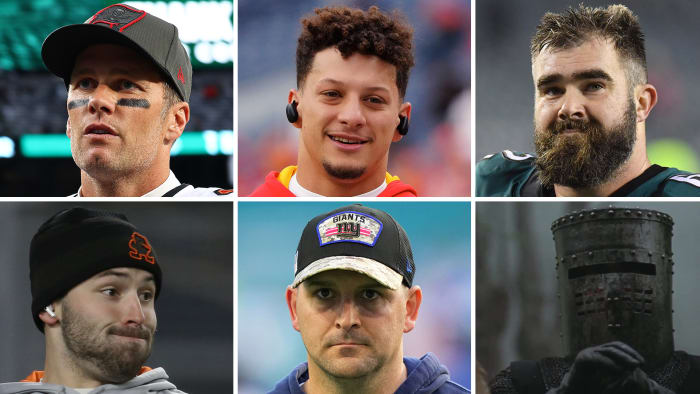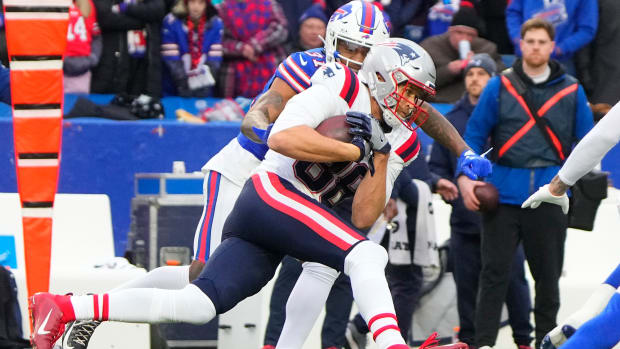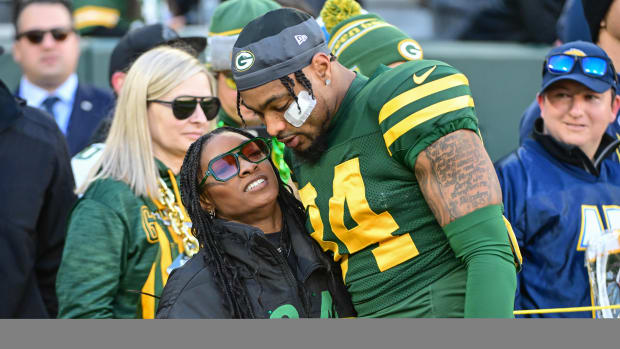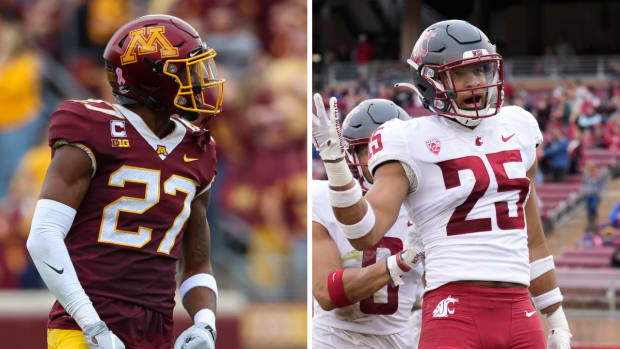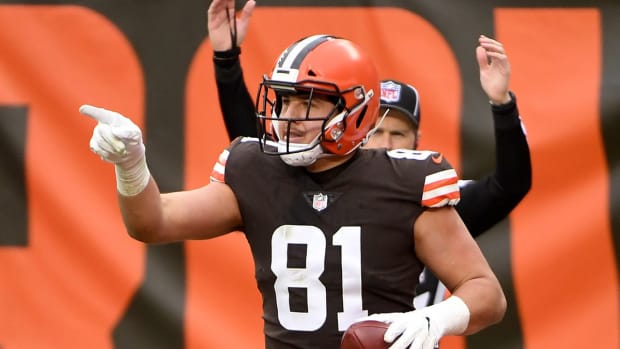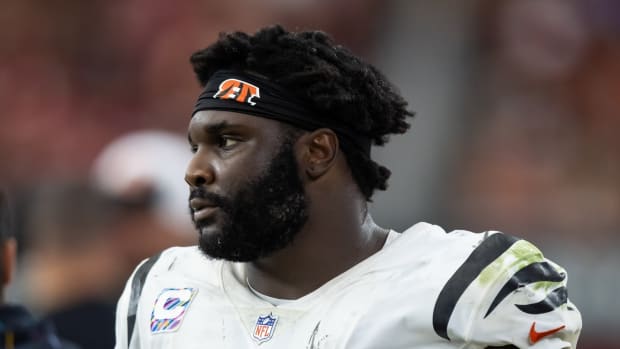On Tom Brady’s Words, Who Gets Compassion and Empathy and Who Doesn’t
1a. Last week, in the first hours after Antonio Brown left the stadium mid-game against the Jets, Tom Brady made a plea for compassion and empathy for Brown. He was right. Everyone should be afforded compassion and empathy in difficult times, and Brown’s past doesn’t exclude him. But it’s important to note that, over the past two years, Brady has not offered that same compassion and empathy for those who were mistreated by Brown. They are human beings who were relegated to footnote status in their own traumatic stories as the greatest player in the history of the NFL, someone with incredible power due solely to his athletic accomplishments, advocated for Brown’s return to the NFL.
At no point should Brown have been subjected to any kind of lifetime or even indefinite ban from the NFL, but he—like anyone with a pattern of destructive and abhorrent behavior—should have to earn a path back. That typically starts with some acknowledgement of what they’ve done. Brown, for the most part, skipped that.
He apologized to “the NFL” and his family. But regarding mistreatment of women that has been chronicled in our independent reporting, police reports, and his own social media accounts, Brown had this to say in an ESPN interview: “I feel like I never really got in a conflict with no woman. I just feel like I’m a target so, anybody can come against me and say anything and I’m going to have to face it. There’s no support, there’s no egos, there’s no rules in it, anyone can come after me for anything. No proof or whatever. ‘He said, she’s saying.’ The media will run with it, so even if I’m not guilty, I already guilty because they already wrote it, put it on TV and put that in people minds. So for me to have to sit here and hear those the allegations of me is just unfair to me every time.”
Accountability is a word I’ve used often in reference to Brown. Regardless of what his issues are, we’re well past the point where he’s responsible for getting any help he needs to correct his behavior, especially with the resources available to him as a professional athlete.
Those who were mistreated by Brown don’t know Brady personally and (perhaps more pertinent) were not going to help him win football games, though it makes them no less human. Sports stars have tremendous influence over society at large. Brady is surely aware of that—a restaurant chain he’d never patronize handed him what’s surely an outrageous amount of money to promote their food, he’s likely receiving similar compensation to promote cryptocurrency even though his grasp on it seems tenuous at best, he can charge upwards of $100 for magic pajama… sorry, “recovery sleepwear.” Brady’s words and actions matter, and in regards to Brown they were to minimize his mistreatment of others, even as Brown showed little interest in redeeming himself.
There was a level of hubris at play in this organization, and Brady himself, thinking they would be the ones to change Brown’s behavior. Self-improvement does not move in an uninterrupted upward trajectory, and Brady and the Bucs were consistently willing to volunteer that Brown was improving. But they were never willing to provide details about why, specifically, they felt he was improving, other than emphasizing that he hadn’t been a problem in the locker room (which was clearly their main concern). And there’s little we’ve seen publicly to suggest Brown’s behavior was getting better.
The Bucs cut ties with Brown over behavior much less problematic than what got him cut from the Patriots two seasons ago; he is gone from Tampa because he caused embarrassment for a football team. The star quarterback and organization that enabled him would do well to look at their own role in the now years-long Antonio Brown drama.
1b. The Bucs organization, of course, has not covered itself in glory over the past week (or, when it comes to Brown, the past year). Bruce Arians, specifically, continues to reveal himself as a less-than-skilled communicator.
In this case, Arians’s public statements, the official injury report, and then his subsequent explanation don’t seem to match up regarding the coach’s knowledge of Brown’s ankle injury, which Brown cited as the reason he refused to re-enter the game against the Jets. Arians said Brown essentially didn’t go through proper protocols by alerting the training staff that his ankle was a problem, but Arians also had to know the ankle injury was a possible issue, and even acknowledged on Thursday that Brown and teammate Mike Evans were “on pitch counts.” Brown is a less-than-reliable narrator of what transpired on the sideline last week, but Arians isn’t inspiring confidence either.
Meanwhile, GM Jason Licht attempted to bolster the Bucs’ side of the story by reaching out to ESPN’s Adam Schefter (perhaps not the bastion of journalistic integrity you’d seek out in such a scenario, but maybe that’s why I’m not an NFL general manager). Licht told Schefter that Brown’s camp had asked for certain contract incentives to be converted to guarantees, and the Bucs had refused. Licht and his colleagues can run their operation as they see fit, but it is a reminder of how dopey contract incentives based on individual statistics are. It goes beyond the fact that football is the ultimate team sport and individual statistical accomplishments don’t necessarily correlate with team success. From the player’s standpoint, Brown realistically could have felt forced to play through an injury in order to hit those numbers and/or was understandably frustrated when the ball wasn’t coming his way, a factor that is largely out of his control. And from the team’s standpoint, if “targets” was indeed was the impetus for Brown’s unhappiness last week, then they just enraged and lost their best receiver—a guy the entire organization debased themselves to bring in in the first place—because they insisted on linking his compensation to a bunch of arbitrary statistical accomplishments.
1c. Regarding Brown’s past seven days, his insistence on airing everything on social media with a complete lack of a filter is ridiculous. He might have a legitimate grievance against the team if they cut him without an injury settlement, but if so he should let his agent, lawyer, and the NFLPA work on his behalf.
2. Your miniaturized Sunday FreakOut, Saturday Edition, takeaways from the underwhelming and largely meaningless doubleheader:
Yeah, Vic Fangio Had to Go For It: It probably wasn’t going to matter, but facing a fourth-and-9 in the red zone and down four with less than five minutes left, you can’t assume you’re going to get a better opportunity to drive for a touchdown. (And I couldn’t help but remember a similar Vance Joseph late-season, Saturday-night, fourth-down management gaffe that had everyone up in arms and helped lead to his ouster in Denver.)
Chiefs Can Execute… Mostly: It was a sloppy field and an overeager officiating crew in Denver. Tyreek Hill was not himself, taking away the big-play threat. So putting together four scoring drives of nine plays or more, with no turnovers along the way, is a good sign for the Chiefs. It’s a big difference from what they were doing during their midseason slump, when they were plagued by drops. But it wasn’t a clean sheet. Mahomes almost threw an interception on a miscommunication with Mecole Hardman, and nearly threw another on a second-reaction play when Hill had, essentially, given up on the play.
What Should Really Concern the Chiefs: Aside from Hill looking far less than 100% healthy, and Travis Kelce limping off the field after the final play of consequence in Denver, the biggest concern for the Chiefs was the number of coverage busts. It looked too much like what went on in September in October with that defense, and it's the kind of thing that shouldn't be popping back up in January. (As for the narrow escape? They were consistently on the other end of those fluky turnovers in the first half of the season, and on Saturday they got one going their way.)
Field Conditions: Add that to the list of issues with the 17-game season.
Drew Lock’s Last Gasp: In all likelihood Lock is going to settle in as a nice, mid-level backup quarterback for the next few years. I’d still be curious to see him in an offense much more like the Shanahan-style system he ran for Rich Scangarello as a rookie. But on Saturday, Lock flashed a touch of the athleticism and arm talent that made him a top-50 pick. If Vic Fangio is going to stay put in Denver, he has to find someone—quarterback, offensive coordinator or both—who will open this offense up.
Preseason in January: It’s the new Christmas in July. Jason Kelce snapping the ball on the first play from scrimmage and then leaving the field was fitting as the game’s best highlight. (Also, poor J.J. Arcega-Whiteside, making his very sad return to primetime.)
3. The Raiders can play themselves into the postseason on Sunday night, which would be a fitting result for one of the most overachieving teams in recent memory. The avalanche of off-field issues for this team has been unfathomable, and those left could have understandably packed it in. But also, this team is also not particularly talented, and they’ve been without their second-most valuable offensive player, Darren Waller, since Thanksgiving.
Usually when a team like that hangs around the playoff picture, they’ve either caught an incredibly soft portion of the schedule against injury-plagued opponents, or benefitted from exceptional—and exceptionally lucky—output in things like turnover differential or red-zone efficiency. The Raiders, however, have been one of the NFL’s worst red-zone teams on both sides of the ball. And only the Jets and Jaguars have worse turnover differentials—the Raiders won the past two weeks despite being -2 in both games. This is a team that isn’t getting the bounces. They’re just, despite it all, good.
4. Between the mangled left shoulder and foot, knee and groin injuries, Baker Mayfield in 2021 was basically the football equivalent of the Black Knight from Monty Python and the Holy Grail (“It’s just a flesh wound!”). And his receivers and tight ends are from the Ministry of Silly Walks. And the coaches are like the “Nobody expects the Spanish Inquisition!” guys. And that’s about all the Monty Python bits I can recall at the moment, but the point is the entire Browns offense is a conglomerate of Monty Python sketches.
As for Mayfield, much to the chagrin of the Progressive Insurance folks, he’s been hinting toward a breakup. It’s likely his way of grasping for some semblance of control over his fate, but he might be right. It’s clear the Browns are going to make a run at any star quarterback who becomes available this offseason (that likely includes Deshaun Watson), even if they’d like to have Mayfield-in-contract-year as their Plan B—he’s a far better bet than any prospect in this year’s draft class.
Mayfield would and should draw plenty of interest if available. This is not a Sam Darnold situation—Darnold never had an extended run with the Jets (or, now, with the Panthers) during which he played like an NFL starting quarterback. The little interest he generated last offseason was due to a combination of physical traits, reputation due to his draft slot three years earlier, desperation, and the fact that everyone was eager to pile blame on the previous coach because that previous coach did not look handsome at his introductory press conference. Mayfield, on the other hand, looked like a quality starter in 2020, something of a Kirk Cousins-plus in the making, lifted largely by scheme, play-calling and supporting cast, but capable of ensuring it would work and sprinkling in the occasional out-of-structure play. Mayfield has his issues operating from the pocket, but he can move around, has plus arm strength, and has shown for long stretches that he can get it done. There’s a very good chance that this season’s disappointment was the product of the injuries and the lack of playmakers among the receivers and tight ends.
Considering the shaky draft class and, for any team that fails to hook Watson, Russell Wilson or Aaron Rodgers, the dearth of veteran alternatives (Jimmy Garoppolo? Maybe Cousins?), Mayfield would absolutely be worth a short-term second contract (if he doesn’t want to play a prove-it year) and a draft package built around Day 2 picks.
5. It was all setting up nicely for Joe Judge. He had been freed of Jason Garrett—who seemed to have been foisted on him in the first place—he received a public pledge that he’d come back in 2022, and the Giants were set to finish up the season with a trip to Soldier Field and then a home date with the Taylor Heinicke-led nameless Washington team, two matchups so abominable that putting them on a television with a second person in the room would qualify as a war crime under the terms of the Geneva Convention.
Judge and this team will soon have a fresh start at offensive coordinator, with Daniel Jones back and still a likely franchise quarterback, plenty of weapons and a chance to address the roster’s shortcomings with what should be two top-10 picks next draft. All Judge had to do was keep his head low and not draw any negative attention to himself.
And then came last week’s bizarre, fantastical post-game media session after a loss to the Bears, during which he:
• Dipped into an alternate universe: Bill Belichick and/or his staff, in 2018, when the Patriots started 7–2 and eventually won the Super Bowl, on the hot seat that season?
• Delivered a Billy Mays-style testimonial about, well, himself: “We got more players here who are going to be free agents next year who are in my office every day begging to come back … There are players who we coached last year that still calling me twice a week talking about how much they wish they were still here and they’re getting paid more somewhere else.”
• Took a turn into what I’m guessing is Joseph Heller-inspired absurdist humor. On their 39-to-16 run/pass ratio in a game they trailed throughout and lost by 26 points: “There was a lot of times with loaded boxes. And we said, Hey, look we’re running you either way. We knew going into the game at some point they were going to recognize the game plan was to run, run, run … They obviously loaded the box, put their bigger personnel in. We were still going to be productive in the run game. That was it.”
I will generously put Judge in the “jury’s still out” category due to the offensive coordinator situation that wasn’t really his doing. And I love to see coaches get a little carried away in comments to the media. But, sheesh, guy, just keep a low profile for the next couple weeks and get out of this season.
6a. My friend, SI colleague and podcast co-host Jenny Vrentas is no longer the second two things. I’m going to hold off for a little bit before I write about her in full (maybe Super Bowl week?). I don't want it to be taken as, simply, “I like my friend.” Though I do like my friend.
For now, I want to make clear how important Jenny is to the present and future of sports media. At the moment there are so few investigative/enterprise reporters across the industry, as league-run media, team-run media and rightsholders put overwhelming resources into their news operations. And most of those reporters have become little more than megaphones for the sports world’s most powerful people and interests (and their lawyers and publicists, or as too many reporters call them, “sources”). I also want to emphasize how well the New York Times did in selecting her to be one of the headliners for what is, apparently, now the largest independent sports journalism operation on the planet.
6b. Also, we’re still doing investigative reporting here and it’s going to continue to be very good! If you ever want to reach out, email our tips inbox, my personal inbox, or Signal/WhatsApp +1-646-306-3983.
7. Ladies and gentlemen . . . The English Baroque Soloists and the Monteverdi Choir, directed by John Eliot Gardiner, performing the work of Wolfgang Amadeus Mozart!
• Question or comment? Email us.
































